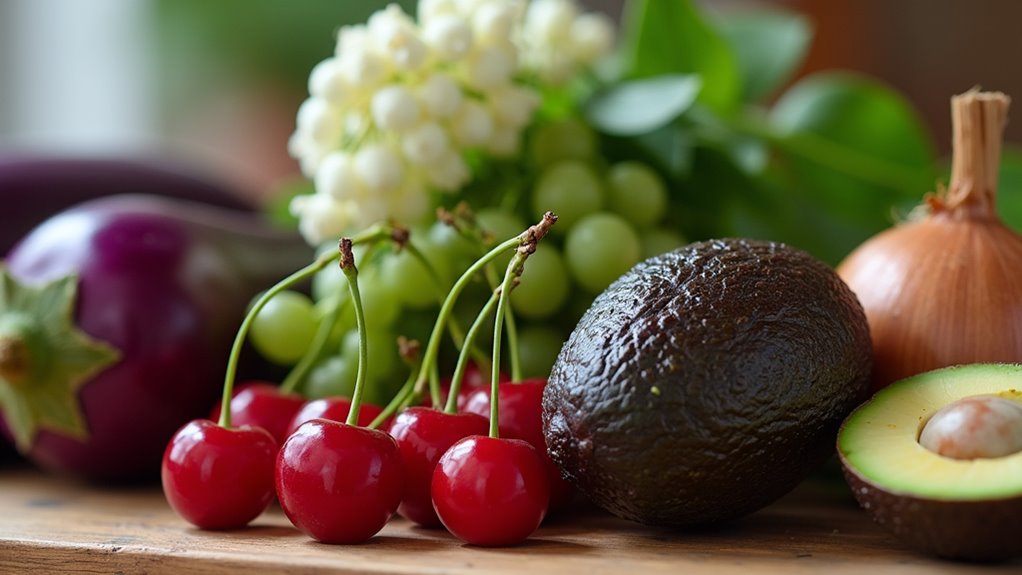Many common foods and plants are toxic to cats and should be avoided as treats. Avoid giving your cat onions, garlic, chocolate, caffeine, or foods containing xylitol, as these can cause severe health issues. Stay away from plants like lilies, poinsettias, and certain houseplants that are harmful if ingested. Even some fish or human snacks can pose dangers, especially if they contain seasonings or additives. Keep your cat safe by understanding which items are dangerous—you’ll find important details to protect your feline friend if you continue.
Key Takeaways
- Avoid feeding cats human foods like onions, garlic, chocolate, caffeine, and xylitol, which are highly toxic.
- Many plants, such as lilies, poinsettias, and philodendrons, are poisonous and should be kept away from cats.
- Fish high in mercury, like tuna, should be given sparingly to prevent poisoning.
- Spicy, salty, or oily foods can cause gastrointestinal issues or nutritional imbalances in cats.
- Always verify if a food or plant is safe for cats before offering or allowing access to prevent poisoning.

Many popular treats can be toxic to cats, so it’s essential to know which ones to avoid. One common concern involves fish dangers. While cats often love fish, giving them too much or feeding them certain types can cause health issues. Fish contains high levels of mercury and other toxins that can build up over time, leading to poisoning. Additionally, raw fish may harbor bacteria or parasites, which can make your cat seriously ill. Even cooked fish isn’t entirely risk-free; it can cause gastrointestinal upset or, in some cases, lead to nutritional imbalances if fed excessively. You should be cautious about offering fish as a treat, especially if it’s prepared with added salt, spices, or oils, which can be harmful to your feline friend. Fish should never replace a balanced diet but can be an occasional, small treat if prepared properly and served in moderation. Proper fish preparation is crucial to minimize risks and ensure your cat’s safety. Moreover, certain fish varieties, like tuna, have higher mercury levels and should be given sparingly to prevent toxicity. It’s also important to note that some fish oils used in treats or supplements can contain additives that may not be safe for cats.
Another area where many pet owners unknowingly put their cats at risk involves human snacks. Many popular snacks are loaded with ingredients harmful to cats, such as onions, garlic, or too much salt. For example, chips, pretzels, and popcorn often contain additives and seasonings that can upset your cat’s stomach or cause more severe health issues. While your cat might be curious or even beg for a bite, these snacks can lead to digestive problems, dehydration, or toxicity. Chocolate, caffeinated products, and foods containing xylitol are especially dangerous, so keep these well out of reach. Sharing human snacks might seem harmless, but it’s a quick way to introduce toxic substances into your cat’s system. Instead, opt for treats specifically made for cats, which are formulated to meet their dietary needs without risking their health.
It’s essential to remember that cats are obligate carnivores, meaning they thrive on meat-based diets and are not meant to consume many human foods. Many foods that seem harmless to humans can be toxic to cats, including certain plants and foods high in fats, sugars, or spices. Always check whether a food or snack is safe for cats before offering it, and when in doubt, consult your veterinarian. Avoid giving your cat fish dangers or any human snacks that contain harmful ingredients because the consequences can be severe, ranging from mild gastrointestinal upset to life-threatening toxicity. Your best approach is to stick with treats made for cats and keep human foods out of their reach, ensuring your feline friend stays healthy and safe. Regularly educating yourself on toxic foods can help prevent accidental poisoning and keep your pet safe. Being aware of potential hazards in human foods is vital for responsible pet ownership. Understanding the signs of poisoning can also help you respond quickly if your cat accidentally consumes something harmful.
Frequently Asked Questions
Can Cats Recover After Eating Toxic Foods or Plants?
When your cat ingests toxic foods or plants, recovery depends on the severity of the poisoning, but there’s often hope. You should seek immediate veterinary care, as treatment options like inducing vomiting, administering activated charcoal, or IV fluids can improve the recovery prognosis. Early intervention greatly increases the chances of a full recovery. Remember, prompt action and professional treatment are essential to giving your cat the best shot at healing.
Are There Any Safe Human Foods for Cats?
Ever wonder if you can share your table scraps with your cat? While some human foods are safe options, most aren’t recommended. You should stick to special cat treats and vet-approved foods. Safe options include small amounts of cooked meat or fish, but avoid onions, garlic, and dairy. Always check with your vet before offering any human foods to guarantee your feline friend stays healthy and happy.
How Can I Prevent My Cat From Accessing Toxic Plants?
To prevent your cat from accessing toxic plants, you should focus on cat-proofing plants and using effective deterrent methods. Place plants out of reach or in hanging baskets, and consider using pet-safe deterrent sprays on your plants to discourage chewing. Additionally, training your cat with positive reinforcement when they avoid plants helps. Regularly monitor your home for new plants and remove any that might pose a risk, ensuring a safe environment.
What Are the Symptoms of Poisoning in Cats?
Imagine your cat’s health as a delicate clock, ticking steadily. When poisoning occurs, symptoms like vomiting, diarrhea, lethargy, or seizures are alarms signaling trouble. Recognize these symptoms quickly, as they’re your guide to emergency response. Immediate action can save your feline friend’s life. Stay vigilant, trust your instinct, and contact your vet promptly if you notice any signs—time is vital in symptom recognition and ensuring proper care.
Is There an Antidote for Common Toxic Foods in Cats?
You wonder if there’s an antidote for common toxic foods in cats. While antidote availability depends on the specific toxin, some substances like hydrogen peroxide can induce vomiting if administered promptly. However, for many toxins, immediate veterinary treatment is essential for effective toxic substance treatment. Always contact your vet or pet poison control before attempting any home remedies, as timely professional care greatly improves your cat’s chances of recovery.
Conclusion
Now that you know which foods and plants are toxic, you can keep your feline friend safe. Avoid giving them treats that could harm their health, and always be vigilant about what’s within their reach. Remember, a little knowledge goes a long way — don’t let your guard down and fall into the trap of thinking “it’s just a small thing.” When you stay informed, you’re truly giving your kitty the best shot at a happy, healthy life.










